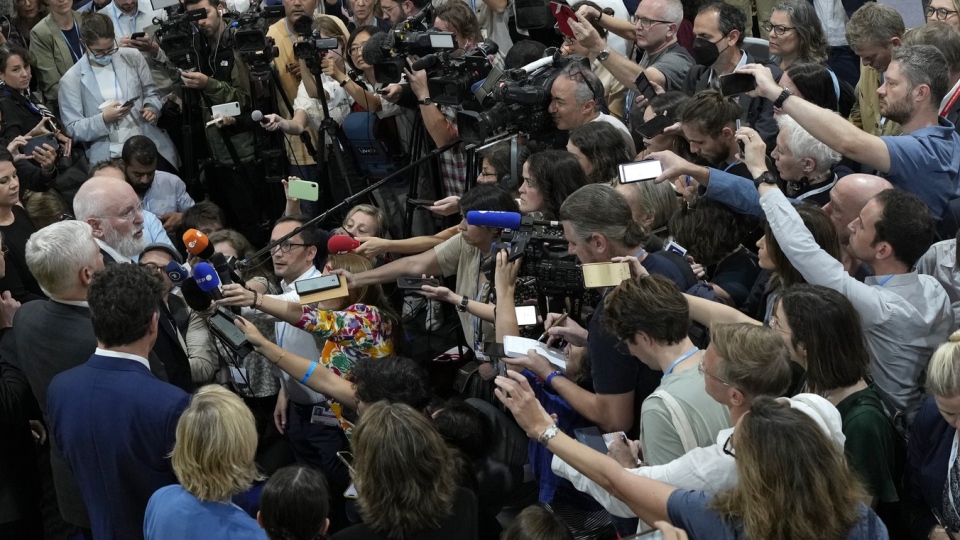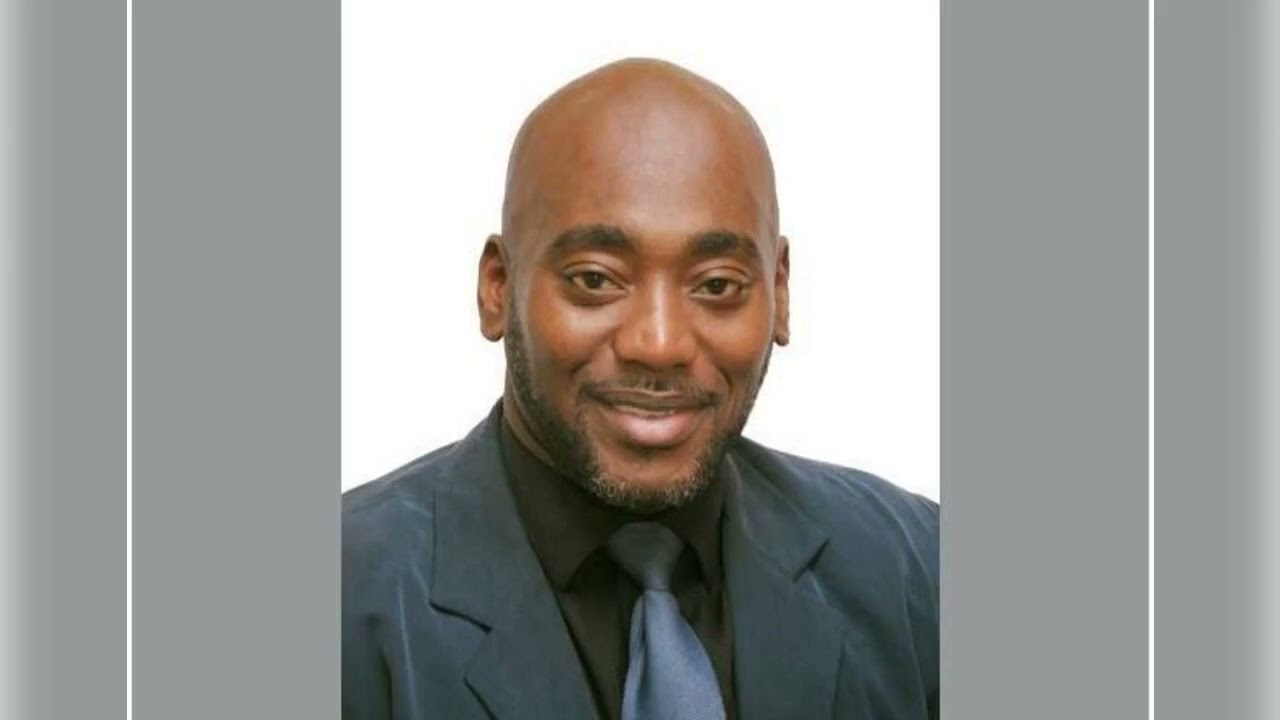Negotiators early Sunday approved a historic deal that would create a fund for compensating poor nations that are victims of extreme weather worsened by rich countries’ carbon pollution, but an overall larger agreement still was up in the air because of a fight over emission reduction efforts.
Talks on the overall agreement were put on hold while delegates were given time to read what they were going to vote on besides the compensation fund they approved to their own applause.
The decision establishes a fund for what negotiators call loss and damage. It is a big win for poorer nations which have long called for cash – sometimes viewed as reparations – because they are often the victims of climate disasters despite having contributed little to the pollution that heats up the globe.
“This is how a 30-year-old journey of ours has finally, we hope, found fruition today,” said Pakistan Climate Minister Sherry Rehman, who often took the lead for the world’s poorest nations. One-third of her nation was submerged this summer by a devastating flood and she and other officials used the motto: “What went on in Pakistan will not stay in Pakistan.”
Maldives Environment Minister Aminath Shauna told The AP Saturday “that means for countries like ours we will have the mosaic of solutions that we have been advocating for.”
It’s a reflection of what can be done when the poorest nations remain unified, said Alex Scott, a climate diplomacy expert at the think tank E3G.
“I think this is huge to have governments coming together to actually work out at least the first step of … how to deal with the issue of loss and damage,” Scott said. But like all climate financials, it is one thing to create a fund, it’s another to get money flowing in and out, she said. The developed world still has not kept its 2009 pledge to spend $100 billion a year in other climate aid – designed to help poor nations develop green energy and adapt to future warming.
The agreement “offers hope to the vulnerable people that they will get help to recover from climate disasters and rebuild their lives,” said Harjeet Singh, head of global political strategy at Climate Action Network International.
The Egyptian presidency, which had been under criticism by all sides, proposed a new loss and damage deal Saturday afternoon and within a couple hours an agreement was struck but Norway’s negotiator said it was not so much the Egyptians but countries working together.
Germany climate envoy Jennifer Morgan and Chilean Environment Minister Maisa Rojas, who shepherded the deal on to the agenda and to the finish line, hugged each other after passage, posed for a photo and said “yeah, we made it!”
According to the agreement, the fund would initially draw on contributions from developed countries and other private and public sources such as international financial institutions. While major emerging economies such as China would not initially be required to contribute, that option remains on the table and will be negotiated over the coming years. This is a key demand by the European Union and the United States, who argue that China and other large polluters currently classified as developing countries have the financial clout and responsibility to pay their way.
The fund would be largely aimed at the most vulnerable nations, though there would be room for middle-income countries that are severely battered by climate disasters to get aid.
Bleary-eyed rumpled delegations began to fill the plenary room 4 a.m. local time Sunday without seeing the overarching cover decision.
Going into the final session, battle lines were drawn over India’s request to change last year’s agreement that called for a phase down of “unabated coal” to include a phase down of oil and natural gas, two other fossil fuels that produce heat-trapping gases. While European nations and others keep pushing for that language, Saudi Arabia, Russia and Nigeria have been insistent on keeping it out.
“We are extremely on overtime. There were some good spirits earlier today. I think more people are more frustrated about the lack of progress,” Norwegian climate change minister Espen Barth Eide told The Associated Press. He said it came down to getting tougher on fossil fuel emissions and retaining the goal of limiting warming to 1.5 degrees Celsius (2.7 degrees Fahrenheit) since pre-industrial times as was agreed in last year’s climate summit in Glasgow.
“Some of us are trying to say that we actually have to keep global warming under 1.5 degrees and that requires some action. We have to reduce our use of fossil fuels, for instance,” Eide said. “But there’s a very strong fossil fuel lobby … trying to block any language that we produce. So that’s quite clear.”
The United States, which in the past has been reluctant to even talk about the issue of loss and damage, “is working to sign on,” said an official close to negotiations.
If an agreement is accepted it still needs to be approved in a unanimous decision Sunday. But other parts of a deal, outlined in a package of proposals put out earlier in the day by the Egyptian chairs of the talks, are still being hammered out as negotiators head into what they hope is their final session.
There was strong concern among both developed and developing countries about proposals on cutting greenhouse gas emissions, known as mitigation. Officials said the language put forward by Egypt backtracked on some of the commitments made in Glasgow aimed at keeping alive the target of limiting global warming to 1.5 degrees Celsius (2.7 Fahrenheit) since pre-industrial times. The world has already warmed 1.1 degrees Celsius (2 degrees Fahrenheit) since the mid 19th century.
Some of the Egyptian language on mitigation seemingly reverted to the 2015 Paris agreement, which was before scientists knew how crucial the 1.5 degree threshold was and heavily mentioned a weaker 2-degree Celsius (3.6 degrees Fahrenheit) goal, which is why scientists and Europeans are afraid of backtracking, said climate scientist Maarten van Aalst of the Red Cross Red Crescent Climate Centre.
Ireland’s Minister for the Environment Eamon Ryan said: “We need to get a deal on 1.5 degrees. We need strong wording on mitigation and that’s what we’re going to push.”
Still, the attention centered around the compensation fund, which has also been called a justice issue.
It’s a reflection of what can be done when the poorest nations remain unified, said Alex Scott, a climate diplomacy expert at the think tank E3G.
“I think this is huge to have governments coming together to actually work out at least the first step of … how to deal with the issue of loss and damage,” Scott said. But like all climate financials, it is one thing to create a fund, it’s another to get money flowing in and out, she said. The developed world still has not kept its 2009 pledge to spend $100 billion a year in other climate aid – designed to help poor nations develop green energy and adapt to future warming.
“The draft decision on loss and damage finance offers hope to the vulnerable people that they will get help to recover from climate disasters and rebuild their lives,” said Harjeet Singh, head of global political strategy at Climate Action Network International.
The Chinese lead negotiator would not comment on a possible deal. European negotiators said they were ready to back the deal but declined to say so publicly until the entire package was approved.
The Egyptian presidency, which had been under criticism by all sides, proposed a new loss and damage deal Saturday afternoon and within a couple hours an agreement was struck but Norway’s Eide said it was not so much the Egyptians but countries working together.
According to the latest draft, the fund would initially draw on contributions from developed countries and other private and public sources such as international financial institutions. While major emerging economies such as China would not initially be required to contribute, that option remains on the table and will be negotiated over the coming years. This is a key demand by the European Union and the United States, who argue that China and other large polluters currently classified as developing countries have the financial clout and responsibility to pay their way.
The planned fund would be largely aimed at the most vulnerable nations, though there would be room for middle-income countries that are severely battered by climate disasters to get aid.
SOURCE: The Associated Press
Make a donation to help support ABN, via PayPal: [email protected]. Follow Antigua Breaking News on Twitter @ABNAntigua and Instgram @AntiguaBreakingNews and on Facebook. Send us a message on WhatsApp at 1-868-704-9864 or email us at [email protected]
CLICK HERE TO JOIN OUR WHATSAPP GROUP FOR NEWS UPDATES.
CLICK HERE TO JOIN OUR WHATSAPP GROUP FOR NEWS UPDATES.
CLICK HERE TO JOIN OUR WHATSAPP GROUP FOR NEWS UPDATES.
CLICK HERE TO JOIN OUR WHATSAPP GROUP FOR NEWS UPDATES.
CLICK HERE TO JOIN OUR WHATSAPP GROUP FOR NEWS UPDATES.
CLICK HERE TO JOIN OUR WHATSAPP GROUP FOR NEWS UPDATES.
CLICK HERE TO JOIN OUR WHATSAPP GROUP FOR NEWS UPDATES.
CLICK HERE TO JOIN OUR WHATSAPP GROUP FOR NEWS UPDATES.
CLICK HERE TO JOIN OUR WHATSAPP GROUP FOR NEWS UPDATES.
CLICK HERE TO JOIN OUR WHATSAPP GROUP FOR NEWS UPDATES.




















